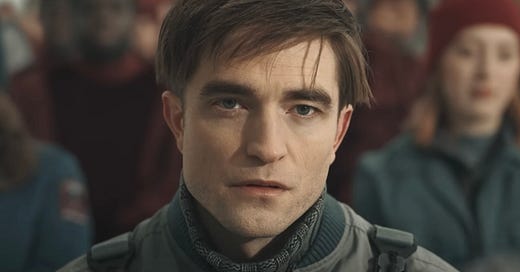Mickey 17 longs to make sweeping and grandiose political statements but has to settle for a referendum on Robert Pattinson’s merits as a leading man. While those who are wholly immune to his charms should stay clear, if you’ve been won over by his transformation into a bona fide leading man, then it’s worth the price of admission, if nothing more than to see what Bong Joon Ho can do with a mega budget.
Bong has been one of the grittiest, most genre-bending international auteurs in the cinematic game. He’s never been one to pull punches or to withhold layering in seriously heavy social critiques. This time, he decides to use this adaptation of 2022 science fiction novel Mickey7 as a pretext to level criticism at a surfeit of targets. The issue is that with all of the opprobrium being spray-gunned in practically every direction, most of it fails to resonate in any tangible way.
What comes across instead is just how much stock Bong places in Pattinson’s aura. Clearly in the director’s eyes, the only thing better than Robert Pattinson is seventeen other Robert Pattinson’s. And therein lies the conceit of Mickey 17, a film that mines the cinematic gifts of an actor who has morphed from a teen idol into a capable leading man, at home in a high stakes independent thriller, or, as evidenced here, in a satirical blockbuster sci-fi film. Pattinson 2.0 was a byproduct of his taking a gamble with the Safdie Brothers on Good Time, a sub-million dollar thriller that he poured his heart and soul into. The critical success of the film allowed him to reinvent himself, casting aside his heartthrob limitations and taking a bite into the meatier fare. The problem here though is that Pattinson’s multitude of versions hover on the same plane, showing little variation, subtlety or depth. Some of that is baked into the script and some of it rests on Pattinson’s inability to plumb the depths further and unearth something more compelling within the material given.
Bong has hitched his wagon to Pattinson’s gifts and thrust him into the role of bellwether for Mickey 17’s creative and commercial viability. This has regrettably become a trend in the industry that, as the slew of other new upcoming trailers, featuring the likes of Michael B. Jordan in Sinners and Robert De Niro tackling both Frank Costello and Vito Genovese in Alto Knights, made clear, is a gimmick that doesn’t appear to be slowing down any time soon. And while those performances may come with éclat, it still begs the question why multiples, like the multiverse theory, have become so ubiquitous in Hollywood.
Once a touchstone of slapstick comedy, it’s become a crutch that enables a director to poach a versatile star with a subpar script who’s just itching to show off their range. Does Tom Hardy join Legend if he isn’t given the opportunity to step in as both Reggie and Ronnie Kray? And sure it was a Pulitzer Prize winning novel, but does Robert Downey Jr. leave the silver screen to dip his toes in television again if he’s not offered the chance to don several different costumes in The Sympathizer?
And this gimmick isn’t relegated exclusively to Hollywood. On the stages of New York, we’re seeing a similar ploy take root. Sarah Snook of Succession lore takes on 26 characters by herself in Dorian Gray to middling critical reaction while Andrew Scott tackles all the eight parts of Uncle Vanya to acclaim. I was treated to the opportunity to watch Andrew Scott at the Lucille Lortel Theatre and was bowled over by the depth, range and versatility on display. And perhaps that’s why I’ve foisted unfair expectations on Pattinson, who I remain a supporter of despite them. If Scott can so seamlessly take a bite out of Chekhov, and provide such variance and emotional punch to each character, it pains me to watch a missed opportunity by Pattinson.
Despite the gimmicky nature at its center, there is still plenty of merit to the project. The journey kicks off with voice-over in medias res as Mickey 17 is left stranded on a distant planet facing impending doom and a near certain death. We then pull back to see how this down-on-his luck earthling found himself in this dire predicament. It turns out that in the year 2050, Mickey Barnes and his friend Timo choose to enlist with a spaceship crew on a mission to colonize the ice-planet Niflheim in order to get out of the crosshairs of a murderous loan shark. Mickey has struck a Faustian bargain, signing up as an “Expendable,” an individual who faces a series of deathly missions, only to be cloned with restored memories after every subsequent death. The leader of this mission is egomaniacal Kenneth Marshall (Mark Ruffalo) who manages to serve as an amalgamation of every narcissistic politician seemingly at once but radiates Elon Musk above all else.
Now four years later, we’re on Niflheim, Mickey has already died 16 times, is about to be killed for a 17th time, only to be saved by the indigenous population on the planet known by the unfortunate pseudonym of “Creepers.” Mistaken for dead, Mickey is cloned again, ensuring that versions or “Duplicates” now roam the spacecraft. Duplicates are illegal and require immediate execution and deletion, which means that both Mickeys now operate out of fear for their own survival. And that, paired with a torrid love affair with security agent Nasha that morphs into a love triangle with both Mickeys, is the narrative that undergirds the proceedings.
So many allegorical flourishes are packed into the film that it’s hard to really latch onto any one. There’s everything from the Muskian desire to spread one’s seed to the full-scale war on local inhabitants and natives. It’s redolent of everything from Trump’s designs on Canada and Greenland to Putin’s lust for the Donbass or Netanyahu’s thirst for Gaza. Expansionism is the flavor du jour and Niflheim acts as a stand in. So too is the notion of the expendable, a commentary on society’s own irrelevance in the face of climate change, oligarchical greed and encroaching AI supremacy. The parallels to Musk are blatant and unavoidable but the target seems to be the entire technocratic class that has long since abandoned feigned concern for humanity. A big klieg light is shone on the abandonment of noblesse oblige with a push by the ruling class to go beyond unspeakable wealth and match it with fame and notoriety, without any regard for the downsides that will come along with the quest.
Meanwhile, the story continues to chug along as Mickey and company confront a seemingly inhospitable native population, an increasingly unhinged and despotic Marshall and a colonizing mission that hangs in the balance. The issue is that although some of the comedic beats land and gags repel, it’s hard to really connect on an emotional level. If the absence of emotion is itself the commentary on the perils of despotism then this film became an empty exercise in commentary and not a meaningful attempt by a masterful director to lean into a big healthy budget and make something of lasting intrinsic value.
The pacing throughout ebbs and flows. At times it feels protracted, and the lack of a compelling arc coupled with an amalgamation of so many different themes and mores, bogs Mickey 17 down in its preachiness. Instead of allowing the narrative to move us on its own accord, we’re treated to way too many versions of a not too dissimilar Pattinson and far too much symbolism to care. Undoubtedly, some of the stakes are removed when the characters’ survival can merely be replenished through a magic box.
It’s a shame that the narrative development was given secondary thought to the political commentary because there’s a lot being explored here that captures the zeitgeist. Are we mere cannon fodder for the Military Industrial Complex or guinea pigs for the medical and technocratic spheres? Are we indeed interchangeable now or can we also turn the clocks back to a time where humans had primacy, or short of that, some level of basic decency and respect? All of those powerful themes are lost in the morass of heavy-handed messaging and the glaring absence of meaningful character development. We don’t really come to understand the various versions of Mickey and the device of multiples falls short.
Like Squid Game, these are indeed characters at a dead end, who trade in any modicum of self-worth for the chance of a radical new life. We get exposed to their various trials and tribulations and the series of machinations by those in leadership positions but none of it connects. On a deeper level, it’s hard to identify when the protagonist dies every few minutes and when the romance that we’re asked to care about, seems purely physical and interchangeable. The whole experiment keeps us at too much of a remove to really latch onto anything, which is a shame because I really like both Pattinson and Bong, the political statements being made and the milieu of the world they strove to construct.
The film is enjoyable but forgettable. And sadly, even Musk at his Nazi-saluting best offers more intrigue. Ultimately, it’s the right message channeled through the right messenger but rendered incomplete through its inchoate realization. The irony is that like Elon, Bong couldn’t land the rocket ship.
Andrew Bell is a writer and director based in New York. A graduate of the Columbia Graduate School of Journalism, he has written for USA Today, The Atlantic and others. His first short film, Idee Fixe, screened at the Time Inc. Theater in New York City and his theatrical directorial debut A Rat in a Trap in a Cage made a limited run engagement at the Atlantic Theater Company Linda Gross Theater. He recently launched The Connective Pod to facilitate unfiltered conversations making sense of a country that’s lost the plot.








Yep - one of the big disappointments of the year, IMO. Not a bad movie, really, but weirdly boring given its premise and Bong's skill. (Interesting, I suppose, that you think Ruffalo's character is an unsubtle Elon Musk parody, instead of the unsubtle Trump parody that everyone else thinks he is.)
Credit where it's due, though: those aliens were pretty adorable! Please just give me a 90-minute movie about oversized tardigrades getting into hijinx, Hollywood, I beg you.
Did anybody else think the villain was way more of a Trump analogue than a Musk parody? He was more of a politician than a tech guy, and the performance felt like a direct impression.